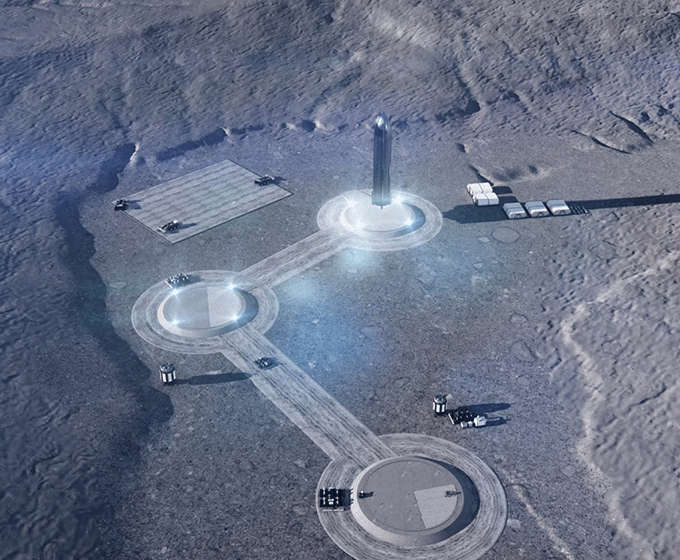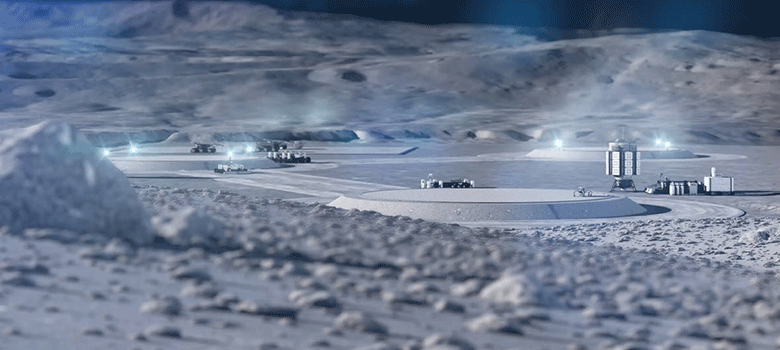
AUGUST 10, 2022 — For UTSA researchers Sazzad Bin-Shafique and Ibukun Awolusi, the Moon is the limit. The professors, faculty in the UTSA School of Civil & Environmental Engineering, and Construction Management, are supporting the development of lunar landing and launch pads as part of their work with Astroport Space Technology.
A division of space startup company Exploration Architecture, Astroport was recently awarded its second NASA Phase 1 Small Business Technology Transfer (STTR) contract for construction work on the Moon.
Astroport, which is located at Port San Antonio, will work to develop geotechnical engineering processes as part of its joint efforts with UTSA.

These renderings depict a lunar launching pad during the early phases of a colony on the Moon. Renderings produced by Tangram 3DS
“Leveraging innovative technologies and systems such as those proposed in this study offers remarkable opportunities for the use of lunar materials, construction processes and our efforts toward achieving space sustainability,” Awolusi said.
The two entities previously collaborated on developing machinery and materials to build a reusable launching pad on the Moon. Last year, a team of UTSA researchers worked on designing an induction furnace nozzle for forming and placing lunar regolith bricks for landing pad construction. They identified the temperatures at which moon soil liquifies. This material will be used to build launch pad bricks on the Moon.
Bin-Shafique and Awolusi’s work will build on the previous research by developing transportation technologies for the bricklaying system of the lunar infrastructure construction.
“This research is a natural progression of the university’s regolith liquefaction investigations, in that the Phase 1 study will develop discreet-event modeling of the bulk regolith conveyance methods to help determine feed rates for Astroport’s Lunatron bricklayer system,” Bin-Shafique said.
UTSA graduate students will contribute to the lunar construction research that will define conveyance techniques and the sorting and filtering process to prepare and deliver excavated regolith to Astroport’s Lunatron bricklayer system.
“This project has the potential to promote UTSA’s research excellence in the sense that it will not only get UTSA students motivated about the opportunity to work with leading researchers and experts to support a unique project like this, but challenge them to be diligent with their research, acquire the experience and knowledge that will set them apart and make them role models to others,” Awolusi said.
Bin-Shafique’s expertise centers on waste and remediation geotechnics — the study and modification of soil and rocks. Awolusi’s research lies in the areas of innovation and technology in construction, sustainable infrastructure and construction materials.
The project will utilize space civil engineering expertise from Australia’s University of Adelaide Andy Thomas Centre for Space Resources (ATCSR). Venturi Astrolab of Hawthorne, California, will provide consulting support for integration into the overall system architecture of their FLEX rover as a baseline robotic mobility platform operating a suite of excavation tools.
UTSA Today is produced by University Communications and Marketing, the official news source of The University of Texas at San Antonio. Send your feedback to news@utsa.edu. Keep up-to-date on UTSA news by visiting UTSA Today. Connect with UTSA online at Facebook, Twitter, Youtube and Instagram.
Move In To COLFA is strongly recommended for new students in COLFA. It gives you the chance to learn about the Student Success Center, campus resources and meet new friends!
Academic Classroom: Lecture Hall (MH 2.01.10,) McKinney Humanities BldgWe invite you to join us for Birds Up! Downtown, an exciting welcome back event designed to connect students with the different departments at the Downtown Campus. Students will have the opportunity to learn about some of the departments on campus, gain access to different resources, and collect some giveaways!
Bill Miller PlazaCome and celebrate this year's homecoming at the Downtown Campus with food, games, giveaways, music, and more. We look forward to seeing your Roadrunner Spirit!
Bill Miller PlazaThe University of Texas at San Antonio is dedicated to the advancement of knowledge through research and discovery, teaching and learning, community engagement and public service. As an institution of access and excellence, UTSA embraces multicultural traditions and serves as a center for intellectual and creative resources as well as a catalyst for socioeconomic development and the commercialization of intellectual property - for Texas, the nation and the world.
To be a premier public research university, providing access to educational excellence and preparing citizen leaders for the global environment.
We encourage an environment of dialogue and discovery, where integrity, excellence, respect, collaboration and innovation are fostered.